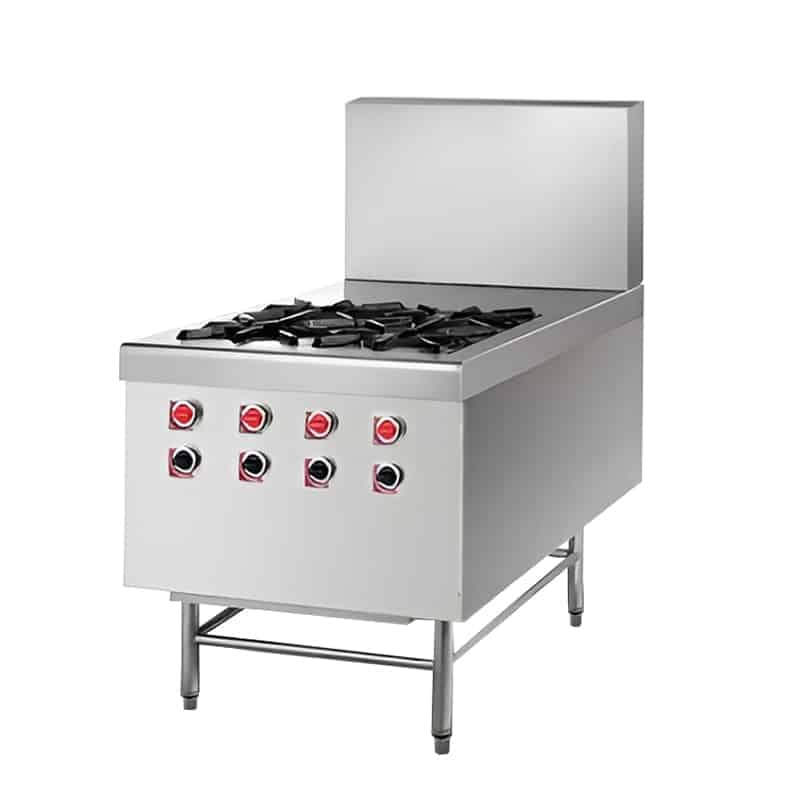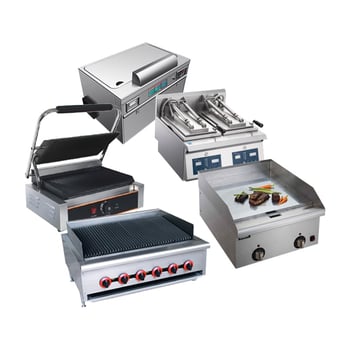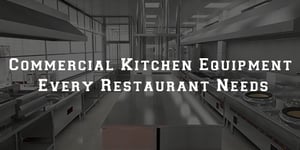Everything You Should Know about Chain Restaurant
You may have eaten at and know something about many chain restaurant, which are distinct and deeply rooted in style. Restaurant chains are usually large, and if you want to learn more about chain restaurants and kitchens, this article will help you.
Mục lục
1. What is a chain restaurant?
A restaurant chain is a business model that refers to a restaurant brand that operates continuously in different regions or multiple locations by opening multiple outlets with the same brand identity, products, services and business philosophy.
In a restaurant chain, the headquarters or parent company holds ownership of the brand and is responsible for developing a standardized business model and standardized processes to ensure consistency and uniformity among different outlets.
Chain restaurants usually offer the same menu choices, service standards and product quality so that consumers can enjoy a similar dining experience from outlet to outlet.
Chain restaurants have the advantage of being able to increase efficiency, reduce costs and build brand image and awareness in different regions through scale of operation and uniform management. Chain restaurants can also expand their locations to meet the needs of different consumers, expand their market share and achieve greater economic scale.

2. What is the difference between chain and franchise?
A chain refers to a series of retail or restaurant outlets that are owned and operated by a single company. The company maintains full control over the operations, branding, and management of each outlet. The company may have multiple locations in different regions or countries, and all outlets follow the same operational and branding standards. Examples of chain businesses include McDonald’s, Starbucks, and Walmart.
On the other hand, a franchise is a business arrangement where the owner of a brand (the franchisor) grants the right to operate under its established brand and business model to an independent operator (the franchisee).
The franchisee pays a fee or royalty to the franchisor in exchange for the use of the brand name, operational support, and access to established systems and processes. The franchisee operates their own business location while adhering to the franchisor’s standards and guidelines. Examples of franchise businesses include Subway and 7-Eleven.
In summary, the main difference between a chain and a franchise is the ownership structure and operational control. In a chain, the company directly owns and operates all locations, while in a franchise, the brand owner grants the right to operate to independent franchisees who follow the established brand and operational standards.
3. How does a restaurant chain maintain consistency?
The most important feature of a restaurant chain is standardization. Customers can enjoy the same flavor of food in any store in any location, which will give them a sense of trust and belonging.
Standardization is not only in the decoration and food flavors of each store, but also in the supply chain management, uniform training and information technology support behind it. Restaurant chains achieve complete consistency through the following complex means.
Uniform image
Restaurant chains have a unified brand identity, trademark and visual image, including logo, store design and decoration style. This consistency helps customers to identify and recognize the brand in different locations.
Uniform menu and food standards
Restaurant chains usually have a uniform menu to ensure that similar food choices and quality are offered at different locations. This includes using the same ingredients, recipes and cooking methods to ensure consistency in food taste and quality.

Operation manual and training
In terms of staff training and management, the restaurant chain will develop detailed operation manuals and standard procedures, including instructions on service flow, food preparation, cleanliness and hygiene. Employees are trained to ensure they are familiar with and comply with these standards to maintain standard service and operational efficiency.
Supply Chain Management
Restaurant chains usually have centralized supply chain management to ensure that different outlets receive the same ingredients and raw materials and that quality standards are met. This helps ensure that the taste and quality of the dishes remain consistent while maintaining food prices at the same level. In chain restaurants, the impact of food price increases is greater than in independent restaurants.
Quality control and monitoring
Chain restaurants conduct regular quality control and monitoring, including in-store inspections, food safety audits, and customer feedback collection. These measures help identify and solve potential quality problems in a timely manner and maintain customer satisfaction.
Technical support and information sharing
Restaurant chains usually use technology systems to manage and monitor the operations of individual stores, including sales data, inventory management, human resources, etc. This allows information to be obtained and tracked in real time so that operations can be adjusted and improved in a timely manner.
4. What are the characteristics of chain restaurant kitchen equipment?
Standardization
Chain restaurants use the same menu and food preparation process in each branch. In order to maintain a consistent taste and quality of dishes, they also choose the same suppliers for kitchen equipment. This means that the type and layout of kitchen equipment may be similar between locations to ensure that the food produced is of the same standard.
Hiệu quả
Restaurant chains like fast food, for example, face high traffic and fast service requirements. To meet these demands, their kitchen equipment is designed to be highly efficient so that food can be prepared and served quickly. This may include features such as rapid heating, rapid cooling, and rapid cleaning to save time and improve overall productivity.

Versatility
Restaurant chains often have standard operating procedures and training programs to ensure that employees are proficient in using kitchen equipment. These operating procedures and training typically cover proper use of equipment, cleaning and maintenance, and food safety. This is reflected in the kitchen equipment, which is required to have relatively easy to operate systems to reduce learning costs and standardize management.
Hoạt động đơn giản
Kitchen equipment in restaurant chains is often designed to be multifunctional, capable of handling a variety of different types of ingredients and dishes. This reduces the number of pieces of equipment and the space they take up, increasing the flexibility and efficiency of the kitchen. An example is a multifunction oven that can perform both steaming and cooking functions.
5. Common chain restaurant kitchen equipment
There are many types of restaurant chains, but they always have some of the most important kitchen equipment in their kitchens. The following brief introduction will help you understand these pieces of equipment and the food they produce.
Stove
There are various types of restaurant chains, commercial ranges are used more in some casual dining and Chinese fast food restaurant chains and less in fast food chains and coffee chains.
Chinese fast food restaurant chains usually prefer open flame ranges with gas as the energy source, and they use high temperatures to quickly stir-fry foods such as stir-fried noodles, stir-fried noodles, and stir-fried vegetables and meats. Large stir-fry ovens with concave sides are also popular.
Whereas casual chain restaurants tend to use electric or induction heating ranges where they only need to heat up sauces, cook pasta and stir-fry some vegetables.

lò nướng
The range of ovens is very wide, as one of the most important cooking equipment in chain restaurants, it can make all kinds of grilled meat, cakes, bread, cookies, burger pastry, baked rice and other delicious food.
There are different types of ovens, and restaurants that specialize in pizza have both professional pizza ovens (or pizza kilns) and regular ovens. In addition, there are also ovens specializing in baking, broilers and so on.
Of course, the most popular is the combination oven, which combines the functions of both steaming and baking, and can also steam and bake at the same time. This increases the range of foods it can cook and has the advantage of being versatile and space-saving for restaurant chains.

Griddle&Grill
A large part of the menu of casual type chain restaurants is supported by commercial griddles, which are used to fry steaks, eggs, vegetables, and seafood (steaks are essential for almost all casual chain restaurants).
The grill is another type that has not a flat heating range, but multiple bumpy stripes, which makes it better for grilling tasks. People like to use it for searing steaks so that the surface of the steak will have nice charred brown streaks.
A special type of griddle is the teppanyaki, which is often placed in the dining area to attract the attention of customers, turning cooking into a performance.

Fryers
Fried food is so popular, especially for fast food chains, that the commercial fryer is the heart of the kitchen. Whether it’s chicken nuggets, fries, nachos, onion rings, tempura or other meat and seafood, the fryer brings the best cooking solution to the restaurant chain.
The space-saving design of the counter-top fryer is suitable for casual chain restaurants, coffee chains, etc. that fry small amounts of food. Vertical fryers have a larger capacity, and many fast food kitchens will place several vertical fryers together and connect a grease filter cart to batch fry food and easily filter impurities from the grease for longer use.
Chefmax can help you choose the right size for your restaurant’s order volume, and there are a variety of fryer types to choose from, including an edit menu, automatic lift function, and a pressure fryer that can quickly cook a whole chicken.

Pizza, salad and sandwich preparation tables
These refrigerated prep tables are common in chain restaurants, and they are usually placed in the kitchen or in front of the dining area (a sneeze guard is added above the unit). They use refrigerated cabinets below and refrigerated food trays above to keep various ingredients fresh.
In contrast to the salad and sandwich prep tables, the pizza prep table will have a wider pallet in front of it for pizza, and you will see it in fast food chains where pizza is the main food, such as Delta and Pizza Hut.

6. Pressure on restaurant chains
Running a restaurant chain is never an easy task, you have to consider too much, and most importantly, not to be left behind by the times.
Maintaining Brand Reputation
The success of a restaurant chain relies heavily on its brand reputation. A negative experience or food safety issue at any one outlet can have a negative impact on the entire brand. Therefore, restaurant chains need to establish effective brand management and crisis management mechanisms to deal with potential problems and challenges.
Coping with competitive pressure
Restaurant chains often face stiff competition, whether from other chains or local independent restaurants. To attract and retain customers, restaurant chains need to constantly innovate their menus, improve service quality, and adapt to changing consumer needs.
Technology and digital transformation
With the rapid evolution of technology, restaurant chains need to keep up with technological and digital trends, such as online ordering, mobile payments and data analytics. This requires investing and adapting to new technologies, and ensuring the security and reliability of systems.
Equipment Modernization
Commercial kitchen equipment in restaurant chains is directly related to cooking efficiency and quality, and can also affect the taste of food. Employees are also less motivated when they are faced with old equipment. Therefore, routine maintenance and updating of kitchen equipment is a requirement for all restaurant chains.
7. Summary
Restaurant chains have a variety of restaurant types that serve customers through consistent décor, service styles and food flavors. Restaurant chains also face pressures and new changes that require constant updates and advancements, including for kitchen equipment.
Chefmax is able to provide a complete one-stop shop for chain restaurant kitchens, from the most basic cooking and refrigeration equipment to water bar equipment, stainless steel worktops and fume hoods.
You can find everything you need to update your kitchen here, with strict quality certification and customization features. If you need more professional information, please liên hệ với Chefmax.



























